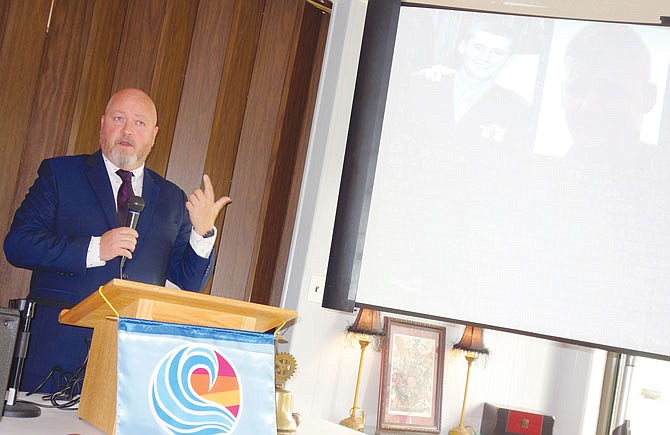Mark Boulton, associate professor of history at Westminster College, brought a painful part of America's past to light Wednesday.
He's taught there for six years. Boulton's main interest is post-1945 United States history "with a particular interest in Vietnam," he said, referring to the multi-decade war there.
America's involvement in Vietnam began with support of the French there in the early 1950s, but Congress and President Lyndon Johnson took the nation's involvement deeper with the Gulf of Tonkin Resolution on Aug. 7, 1964. Seven Westminster students, some alumni, died there in the 1960s, and they are being called the Westminster Seven.
They include:
Harmon L. Remmel III, born Jan. 21, 1943, and from Fayetteville, Arkansas. He was in the Westminster Class of 1965 and was a first lieutenant in the Army. He died Feb. 7, 1968, at age 25 in Phu Bon Province.
Philip Howard Sauer, born July 6, 1942, and from Coronado, California. He was in the Westminster Class of 1965 and was a first lieutenant in the Marine Corps. He died April 24, 1967, at the age of 24 in Quang Tri Province.
Ross Whittier Livermore, born Nov. 18, 1945, and from Germantown, Tennessee. He was in the Westminster Class of 1967 and was a first lieutenant in the Army. He died Jan. 4, 1969, at the age of 23 in Dinh Tuong Province.
Christopher "Pod" Podmaniczky, born Dec. 25, 1946, and from St. Louis. He was in the Westminster Class of 1969. He was a private first class in the Marines and died April 21, 1967, at the age of 20 in Quang Nam Province.
Patrick Lawrence Purdin, born March 17, 1948, and from Long Beach, California. He was in the Westminster Class of 1970. He was a medic in the Navy, attached to the Marines, and died Nov. 22, 1969, at the age of 21 in Quang Nam.
John Vernon Taylor Jr., born March 24, 1940, and from Fulton. He was in the Westminster Class of 1962. He served as a captain in the Army and died Nov. 4, 1967, at the age of 27 in Kontum Province.
Claude L. Curtice Jr., born Dec. 7, 1926, and from St. Louis. He was in the Westminster Class of 1952. Formerly a soldier, at the time of his death he worked with refugees in Vietnam and was U.S. Deputy Chief for Refugees at Da Nang, Vietnam. He died Jan. 30, 1968, at the age of 44.
There are constantly new lessons to be learned by the Vietnam War, Boulton told members of the Fulton Rotary Club on Wednesday.
"It hard to believe it's 50 years in the rear-view mirror," he said of that war.
Memories are still painful to the families of those who died, and to the soldiers who served there and came home to an angry country.
Numbers vary on how many people died in Vietnam. Some report about 1,118,000 people died in the Vietnam War between 1965-74. American deaths numbered 58,220, according to the National Archives - but of those, about 41,000 were killed in action, 9,107 died by accident and others died from other causes. The Department of Defense reported the U.S. spent about $168 billion over 14 years in the war - that's $950 billion in 2011 dollars.
Questions were raised, like what is an "appropriate" level of protesting? How much collusion between governments was there? How many died as the result of prolonging the war into the Nixon era?
Last summer, Boulton went to Vietnam for the second time, taking along a group of students, former soldiers and others. They toured the coastal country with a group of former American soldiers who fought in Vietnam. And they left seven stuffed blue jays representing Westminster's mascot near the spots where members of the Westminster Seven died.
"It was a small gesture; in some way, there's a small part of Westminster over there," Boulton said.
The people of Vietnam welcomed them with open arms and no resentment about the war and its inhumanity.
"It's astonishing how welcoming they are," Boulton said. "They were genuinely, incredibly welcoming."
One person on the trip was a former soldier who fought at the Battle of Hamburger Hill for 10 days in May 1969. The hill had no real tactical significance, and soon after the U.S. forces won the "Ap Bia Mountain," they abandoned it to the North Vietnamese soldiers.
"He was desperate to get up there," Boulton said of the former solder's journey back to Vietnam.
The soldier had been carrying around hatred for years after this battle, but this trip changed him. He lost his wallet which contained all his money, but people found it and made much effort to get it back into his hands.
"Four different Vietnamese people tried to find him and get it back to him," Boulton said. "A lot of vets started to see a different side."
On Wednesday, just before speaking, Boulton received a packet of information that included Taylor's nomination for a Silver Star and new information about how he died. There is so much more to learn about these soldiers, so this student-driven research project is ongoing.
But those who traveled with Boulton to Vietnam last May learned a lot by simply standing in the soldiers' footprints.
"Learning about their stories really got the Westminster students engaged," Boulton said, adding one student is writing his masters thesis about the Westminster Seven.
Learning intimately about those who served and died, or came home with life-long scars, may make Americans think more about the necessity of war.
"We can try to avoid the same mistakes as before," Boulton said. "The Vietnam War will continue to be a passion of mine. I want to pay my respects to those individuals."

